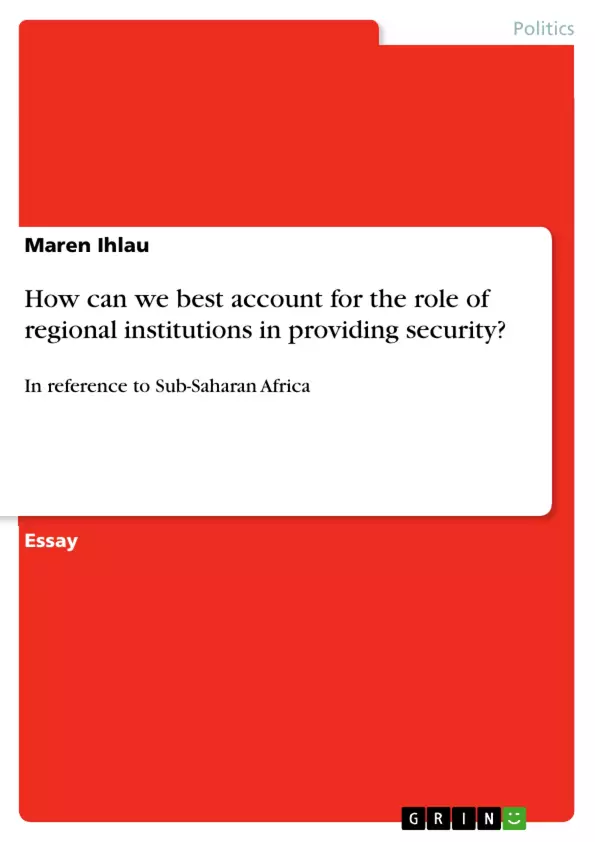This essay addresses the question in how far regional institutions provide security. It will be analysed whether states use regional institutions as a tool to pursuit their national self-interest or whether regional organisations have an influence on a country's perception on security matters and help to create a security community.
The Cold War period had a dual effect on regional conflicts. Conflicts that would otherwise have been local were subsumed within the superpower competition of the US-led (capitalist) Western and Soviet-led (communist) Eastern bloc. Fearing the other power might gain political influence such as in Africa, each superpower was driven to assist one or the other party of a conflict. Since the beginning of decolonization which began after the Second World War, the regional level of security became more autonomous and prominent in the developing world and the end of the Cold War accelerated this process. Both the remaining superpower (United States) and the other great powers had less incentive and were less inclined to intervene in security affairs outside their own regions. For these reasons, regional institutions have become more involved in the maintenance of peace and security in different parts of the world, e.g. the Association of Southeast Asian Nations (ASEAN), the Economic Community of West African States (ECOWAS) and the Southern African Development Community (SADC). The emergence of regional organisations has brought about contrasting views on their effectiveness as providers for security. Whereas skeptics claim that member states use regional institutions to follow their national self-interest instead of pursuing collective security, advocates argue that regional organisations are important components of any lasting peace.
Inhaltsverzeichnis (Table of Contents)
- Regional Institutions as providers of security
- Sub-Saharan Africa as a security region
- Examination of theories
Zielsetzung und Themenschwerpunkte (Objectives and Key Themes)
This essay aims to investigate the role of regional institutions in providing security, specifically focusing on sub-Saharan Africa. It examines whether these institutions are merely tools used by states to advance their interests or whether they contribute to a shift in states' perceptions of security and facilitate the creation of a security community.
- The impact of regional institutions on security provision in sub-Saharan Africa
- The contrasting viewpoints of skeptics and advocates regarding the effectiveness of regional institutions
- The influence of realism, new institutionalism, and constructivism on understanding the role of regional institutions in security
- The evolving relationship between states and regional organizations as providers of stability
- The challenges and successes of regional institutions in managing conflicts and promoting peace in sub-Saharan Africa
Zusammenfassung der Kapitel (Chapter Summaries)
- Regional Institutions as providers of security: This section explores the concept of security, its evolving definition, and the significance of regional institutions in providing security. It discusses the historical context, particularly the role of the UN, and examines the various definitions and features of regional institutions. It also highlights the importance of regional institutions in addressing security issues in sub-Saharan Africa, where states often struggle with internal instability and external threats.
- Sub-Saharan Africa as a security region: This section provides an overview of the security challenges facing sub-Saharan Africa. It emphasizes the unique characteristics of states in the region, such as weak state structures, neo-patrimonial regimes, and the impact of colonial legacies on security dynamics. The Southern African Development Community (SADC) is introduced as a key regional organization in the context of sub-Saharan Africa.
- Examination of theories: This section examines different theoretical perspectives on the role of regional institutions in providing security. It discusses realism, which suggests that states primarily pursue their self-interest and use institutions as tools for power projection. It then explores new institutionalism, highlighting the importance of institutions in shaping political outcomes and promoting cooperation. By analyzing the case studies of the conflict in the Democratic Republic of Congo (DRC) and the evolving security architecture of SADC, this section demonstrates the complex interplay of these theories in understanding the role of regional institutions in sub-Saharan Africa.
Schlüsselwörter (Keywords)
The primary keywords and focus topics of this essay include regional institutions, security, sub-Saharan Africa, state interests, collective security, realism, new institutionalism, constructivism, Southern African Development Community (SADC), conflict management, peacebuilding, and security community.
Frequently Asked Questions
What role do regional institutions play in security provision?
Regional institutions like ASEAN, ECOWAS, or SADC have become central to maintaining peace, as great powers are often less inclined to intervene outside their own regions post-Cold War.
How do theories like realism view regional organizations?
Realists often claim that member states use regional institutions merely as tools to pursue their national self-interests rather than collective security.
What are the specific security challenges in sub-Saharan Africa?
Challenges include weak state structures, neo-patrimonial regimes, internal instability, and the complex legacies of colonialism.
What is the significance of SADC in regional security?
The Southern African Development Community (SADC) serves as a key framework for conflict management and promoting stability among its member states in Southern Africa.
Can regional institutions help create a "security community"?
Advocates argue that these organizations can shift states' perceptions of security, leading to lasting peace and a shared sense of collective stability.
- Quote paper
- Maren Ihlau (Author), 2009, How can we best account for the role of regional institutions in providing security?, Munich, GRIN Verlag, https://www.grin.com/document/160415



